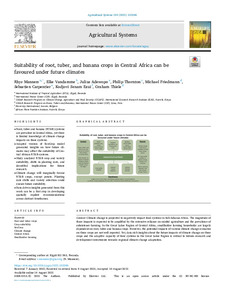Context Climate change is projected to negatively impact food systems in Sub-Saharan Africa. The magnitude of these impacts is expected to be amplified by the extensive reliance on rainfed agriculture and the prevalence of subsistence farming. In the Great Lakes Region of Central Africa, smallholder farming households are largely dependent on root, tuber and banana crops. However, the potential impacts of various climate change scenarios on these crops are not well reported. Yet, data-rich insights about the future impacts of climate change on these crops and the adaptive capacity of food systems in the Great Lakes Region is critical to inform research and development investments towards regional climate change adaptation. Objectives We aimed to gain insights of potential impacts of climate change on root, tuber, and banana crops in the Great Lakes Region, specifically investigating changes to localised crop suitability, planting dates, and identifying potential ‘climate-proof’ variety types of each crop for specific geographies. Methods We developed a modified version of the EcoCrop model to analyse the suitability of future climates for four key root, tuber, and banana crops (banana, cassava, potato, and sweetpotato) and a suite of varieties for each (typical, heat-tolerant, drought-tolerant, and early maturing). The model considers only the direct impacts of climate change on crop suitability. It does not consider how climate change impacts crop suitability by affecting the occurrence of extreme weather events or indirect effects on incidence and severity of pest and disease outbreaks. Results and conclusions Our results demonstrate that climate change will be somewhat favourable to root, tuber, and banana-based systems, with only widespread negative impacts seen for potato. These changes should be qualified by the observation that in most cases the environmental suitability for banana, cassava, and sweetpotato will remain constant or improve if farmers shift planting schedules. Location- and crop-dependent shifts to different variety types were found to be effective in improving suitability under future climates. Significance Data driven insights generated from this work can be used as a first step in developing spatially explicit recommendations for both farmers and decision-makers on how to adapt to climate change and plan investment in the research needed to adapt root, tuber, and banana-based livelihoods and systems to those long-term changes.
Suitability of root, tuber, and banana crops in Central Africa can be favoured under future climates
Citation: Manners, R.; Vandamme, E.; Adewopo, J.; Thornton, P.; Friedmann, M.; Carpentier, S.; Ezui, K.S.; Thiele, G. (2021) Suitability of root, tuber, and banana crops in Central Africa can be favoured under future climates. Agricultural Systems 193: 103246. ISSN: 0308-521X
2021-08-19
Central Africa
journal_article

